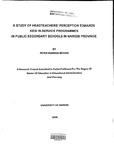| dc.description.abstract | The need for headteachers' training on management is very vital for an organisation such as a school as it not only builds confidence but also prepares the particular headteacher to be adequately armed to cope with the emerging changes in educational management.
Prior to the establishment of KESI in 1981, headteachers employed all methods within their disposal coupled with what they learned in college to manage schools. These could however, not suffice as society and educational institutions became more and more complex.
The purpose of this study was to identify the perceptions that headteachers held towards the in-service programmesorganised by KESI. The study was carried out in public secondary schools in Nairobi province. The literature review was organised under the following subheadings: need for professional training; Kenya Education Staff Institute (KESI); training activities for secondary school headteachers; participants' involvement in programmes design and evaluation; appraisal of professional development programmes and critical concerns for school administrators.
The study was an ex-post facto design and the targeted population consisted of headteachers in public secondary schools in Nairobi province.
Two types of research instruments were used-one was administered to secondary school headteachers in Nairobi province while the other was administered to KESI course facilitators. The headteacher's questionnaire was divided into three sections
A, Band C where some of the items in the questionnaire were structured while others were open-ended. Section A of the headteachers' questionnaire gathered demographic data and training background. Section B gathered data on such programmes components as topics for newly appointed headteachers, the in-service duration the quality of training personnel, content mastery and delivery, training techniques and the aspects they would recommend for improvement of KESI in service programmes. Section C explored headteachers' perception on course content, course duration and the participants' perceptions on the training personnel rated on a five point Likert Scale.
The KESI staff questionnaire gathered more information on their opinions and their perceptions on KESI in-service programmes and training personnel's perceptions on headteachers' needs.
To determine reliability of the instruments, a pilot study was conducted in five schools randomly selected from the public secondary schools in Nairobi. After establishing the reliability and validity of the instruments, they were then administered to 37 public secondary schools in Nairobi province and 4 KESI staff. The questionnaire return rate was 100%.
The analysis of data consisted of Analysis of Variance (ANOVA) and the level of significance was set at 0.05. Seven null hypotheses were tested. The following are the findings of the study:
i) Public secondary school headteachers in Nairobi province perceived KESI in-service programmes to be relevant, but they were not adequate to meet their administrative needs.
ii) Managerial and financial role of a headteacher; finance and budgeting;
types of fraud and their prevention in financial management; fees defaulting and difficult parents; emerging issues such as drugs, HIV and AIDS, homosexuality; students indiscipline; procurement; laws governing education and their implication; industrial I labour laws;
democratisation; influence of the media on education and how to use a
deputy without abdicating were the major administrative challenges that headteachers face with financial management and human resource management being the most imminent.
iii) Secondary school headteachers' perception of KESI in-service programmes were not affected by such variables as administrative experience, level of education, number of times of attending KESI courses, as the headteachers felt that learning is a lifetime process and one needs to keep abreast of the dynamism in education management.
iv) Headteachers in public secondary schools felt that headteachers should attend KESI in-service courses after every three to four years.
v) All headteachersshould attend KESI organised courses irrespective of their school sizes.
vi) KESI courses are relevant to all headteachers in all public secondary
schools and not only to newly appointed heads.
vii) Headteachers in public secondary schools in Nairobi province felt that
KESI in-service programmes were not affected by the number of years
taken since in-service by KESI and their gender as they all needed to be "properly equipped" so as to cope with emerging challenges in school administration.
The recommendations of the study are as follows:
i) KESI course co-ordinators should endeavour to consult headteachers on the topics they wish to be covered especially the ones they are weak in, before such packages are offered to clientele (headteachers).
ii) A management information system should be created so as to provide feedback to KESI course co-ordinators on headteachers who have attended their courses and those who have not.
iii) Courses on financial management, human resource management and student discipline should be intensively and extensively covered since they are still problem areas to headteachers even after attending KESI in-service courses.
iv) KESI personnel's content delivery is good but they should endeavour to improve.
v) Ample time should be allocated on each topic covered during KESI in service courses if topics are to have meaningful impact on headteachers' management skills.
vi) Headteachers should be appointed on the basis of qualification, experience and performance if they are to make impact in the institutions they head.
vii) Alternative funding for KESI activities should be sourced so as to bridge the current shortage of professional staff; improve quality of
training equipment and achieve 100% participation by all concerned educational managers.
viii) KESI should be made autonomous and course co-ordinators to hold advanced degrees and have them recruited directly by KESI itself.
The following research areas are suggested for further research:
i) Replication of this study using an interview schedule as the research instrument with headteachers.
ii) A comparative study on the perceptions of public secondary school
headteachers on KESI in-service programmes in rural and urban setting.
iii) A study of the perceptions of KESI in service programmes by provincial
directors of education and their deputies in the ministry of education.
iv) A study of the perceptions of KESI in-service programmes by private secondary school headteachers in Nairobi province. | en |

